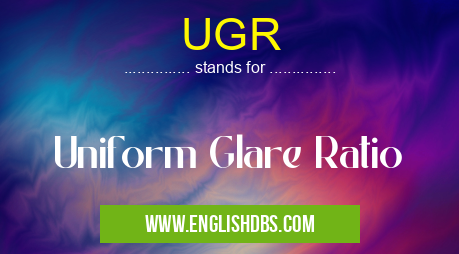What does UGR mean in UNCLASSIFIED
Uniform Glare Rating (UGR) is a metric used to quantify the discomfort caused by glare in a given lighting environment. It is a system developed by the International Commission on Illumination (CIE) to assess the potential for visual discomfort from direct light sources in interior spaces.

UGR meaning in Unclassified in Miscellaneous
UGR mostly used in an acronym Unclassified in Category Miscellaneous that means Uniform Glare Ratio
Shorthand: UGR,
Full Form: Uniform Glare Ratio
For more information of "Uniform Glare Ratio", see the section below.
What is UGR?
UGR is a numerical value that ranges from 10 to 35. A higher UGR indicates a greater potential for glare and visual discomfort. The UGR is calculated using a formula that considers the following factors:
- *Luminance of the glare source
- *Solid angle subtended by the glare source
- *Position of the glare source relative to the observer
- *Background luminance
- *Luminance distribution of the surroundings
Significance of UGR
UGR is a widely accepted metric for assessing glare in indoor environments. It is used by lighting designers and architects to ensure that lighting systems meet the recommended comfort levels and prevent visual discomfort. High UGR values can lead to reduced visual performance, eye strain, headaches, and fatigue.
UGR Guidelines
The recommended UGR guidelines vary depending on the type of space and the activities performed within it. For example, offices and classrooms typically have lower UGR limits (19-22) to minimize visual discomfort during prolonged work or study sessions. On the other hand, spaces like warehouses and industrial facilities may have higher UGR limits (25-28) due to the presence of bright light sources and reflective surfaces.
Essential Questions and Answers on Uniform Glare Ratio in "MISCELLANEOUS»UNFILED"
What is Uniform Glare Ratio (UGR)?
UGR is a metric used to assess the potential for glare in a given lighting environment. It measures the discomfort or annoyance caused by the brightness of light sources within a field of view.
How is UGR calculated?
UGR is calculated using a formula that considers the luminance of light sources, their solid angles, and the observer's position. The higher the UGR value, the greater the potential for glare.
What is an acceptable UGR level?
Acceptable UGR levels vary depending on the application. For general office spaces, a UGR of 19 or less is typically considered acceptable. However, for areas where precision work or visual comfort is crucial, a lower UGR of 16 or less is recommended.
How can I reduce UGR in a lighting design?
There are several strategies to reduce UGR in lighting design, including:
- Using indirect or recessed lighting fixtures
- Installing diffusers or louvers to shield light sources
- Reducing the number or brightness of light sources
- Optimizing the placement of light fixtures to avoid direct glare
Why is it important to consider UGR in lighting design?
Excessive glare can lead to discomfort, reduced productivity, and even health issues such as eye strain and headaches. By controlling UGR, lighting designers can create more comfortable and visually pleasing environments.
Final Words: UGR is a crucial metric for evaluating glare in lighting environments. By understanding the factors that contribute to UGR, lighting designers can create lighting systems that provide optimal visual comfort and minimize the risk of glare-related problems.
